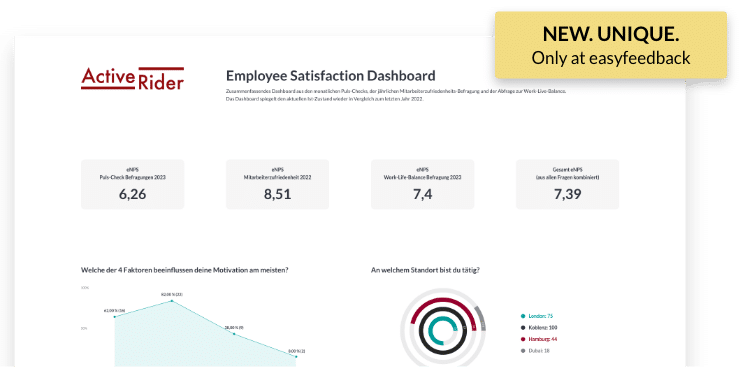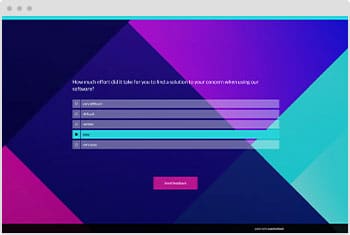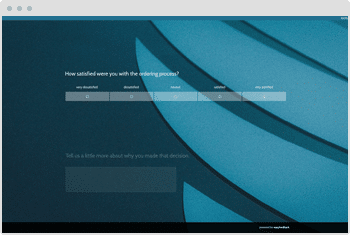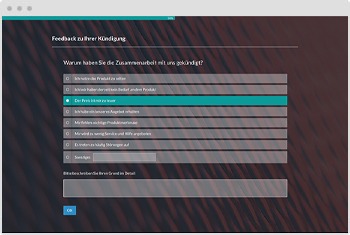How you can increase the customer experience?
Find out with the NPS

With this ready-to-use survey template, you can measure the Net Promoter Score® to derive targeted measures.

“Identifying customer needs is an essential part of our business. easyfeedback accompanies us for many years as a loyal partner in this task. We particularly appreciate the intuitive usability of the survey tool as well as the professional support.”
Guild Lead User Experience Research

“We use easyfeedback for internal and external surveys – fast, comfortable and really easy! Straightforward and cordial support can always create a smile. We really appreciate the permanent development of the platform.”
Guest & Competitor Insights Analyst
Content and targets of this NPS survey template
In order to actively improve customer loyalty, you first need to know your customers’ purchasing decisions and use a customer survey to find out what they expect from your products and services.
With this information, you can proactively make improvements and thereby satisfy your customers. The wonderful thing about satisfied customers? They return again!
This means you have more cross-selling opportunities at the same time. Plus, your satisfied customers will be willing to actively recommend you to others. And you can find out all this by asking for the Net Promoter Score®.
The NPS is the most widely used method for measuring customer loyalty. This makes it an internationally measurable metric that you can use to easily measure yourself against your competitors.
Use easyfeedback as a Net Promoter Score tool and increase customer satisfaction and customer loyalty based on our questionnaire template.
Content:
• Asking for willingness to recommend
• Measuring customer satisfaction with key figures
• Identify customer wishes & needs
Targets:
• Prevent customer churn
• Win back dissatisfied customers
• Increase customer experience
• Attract promoters
• Increase growth
• Increase sales

Data privacy protection „made in Germany“ (GDPR)

Anonymity functions for open feedback
Almost everything you need to know about the NPS
1. What is the NPS?
The NPS is a key figure that measures how high the willingness of customers to recommend a company is. In other words, how satisfied customers are with a service, a product or a company.
2. What alternatives are there to the NPS?
Other methods for quantitatively measuring customer satisfaction, in addition to the Net Promotor Score (NPS), include the Customer Satisfaction Score (CSAT), the Customer Effort Score (CES), and the Things Gone Wrong metric (TGW).
3. Why take an NPS survey?
Satisfied customers are more likely to recommend vendors, products, and services to others, have higher price tolerance, and ultimately bring your company more revenue.
Customer satisfaction is a key economic success factor for your business. Therefore, it is wise to consider this indicator as a control variable.
The following correlations can also be found between the level of NPS and the following variables: Sales, upsell rates, actual referrals made, repeat purchases, and contract cancellations/churn rates.
4. What are the benefits of the Net Promotor Score?
The Net Promotor Score is a simple method to determine satisfaction and provides transparency along the entire customer journey. It also enables targeted communication and helps identify multipliers. It shows strengths and weaknesses of your offer and enables comparison with the competition.
5. How do I prepare an NPS survey?
Before you start with the Net Promoter Score measurement, you should define exactly which construction site you want to address with the survey and at which touchpoints of the customer journey you want to reach your customers.
It is important that you define the goal and then think about a concept.
If you need to convince a higher level of management to implement a Net Promoted Score measurement, do it with numbers.
6. How does the NPS survey work?
The NPS can and is used within the customer journey at different touchpoints. For example, after the consultation, after the purchase, after contact with support, after a complaint, etc. For a first big overview, it can make sense to query the customer’s touchpoints.
As you already know, the NPS measurement always includes the question about the tendency to recommend on a scale of 0 – 10. The query is usually made via e-mail, on the website in a pop-up or in the confirmation page after the purchase.
Here, 10 stands for the highest probability of a recommendation and 0 for the lowest.
7. How is the Net Promotor Score calculated?
The Net Promotor Score is calculated from the number of promoters in percent minus the number of detractors in percent. Accordingly, the NPS always has a value between -100% and +100%. Whereby -100% is the worst possible result and +100% the best possible result.
8. What is a good NPS?
To be honest, the question of what a good NPS is cannot be answered across the board. Generally speaking, a Net Promoter Score that is below 0 would be an indication that your company has a lot of problems to solve.
A score between 0 and 30 is a good range, but there is always room for improvement. If your NPS is higher than 30, it would indicate that your business is doing well and has far more satisfied customers than dissatisfied ones.
An NPS above 70 means that your customers love you and are likely to recommend you very often. The higher the NPS, the more likely it is that new leads and more sales will be generated from customer referrals.
9. How can I improve my NPS?
Take meaningful action from the NPS survey, rely on teamwork to increase customer satisfaction, engage in dialogue with your customers, learn more through targeted customer surveys, and use multipliers.
You are in professional company







easyfeedback welcomes more than 740.000 participants per month!







